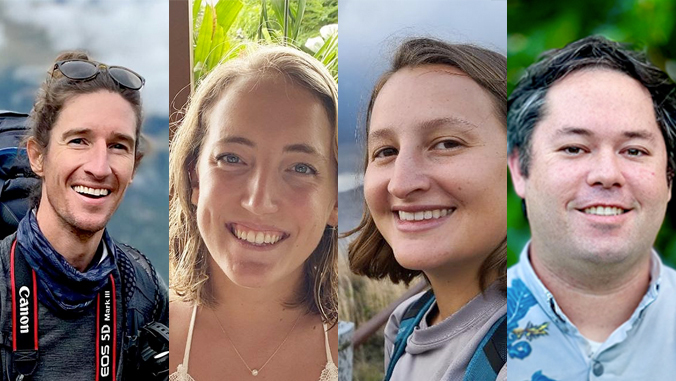
To obtain relevant resource management and policy experience and use the knowledge to give back to Hawaiʻi’s communities, four postgraduate fellows from the University of Hawaiʻi have a unique opportunity to work directly with Hawaiʻi-based organizations through the UH Sea Grant College Program (Hawaiʻi Sea Grant) E. Gordon Grau Coastal and Marine Resource Management and Policy Fellowship Program (Grau Fellowship).
The paid fellowship, named in honor of Emeritus Professor E. Gordon Grau, Hawaiʻi Sea Grant’s visionary former director, provides students the chance to pursue career opportunities in Hawaiʻi.
Island-based management strategies
The Department of Land and Natural Resources Division of Aquatic Resources (DAR), which has hosted fellows continually since 2019, is welcoming two new fellows this month to work on its Kōkua Community-Based Monitoring Program and its Holomua Marine Initiative.
John Graves and Hoaka Thomas will be working in partnership with local communities and DAR staff to gain experience in designing island-based management strategies and community-based monitoring plans.
Graves, who completed a master’s degree at UH Hilo and studied coral reef ecology and resilience, said, “At the end of the day, both marine resource managers and community members want the same thing—for our oceans to remain healthy and abundant in the coming years. I eagerly look forward to being a part of building bridges with our local community, and to develop my expertise in marine policy as a Grau Fellow.”
This unique opportunity provides the fellows who already have strong backgrounds in marine biology and natural sciences with the chance to connect and communicate with broad audiences, and develop policies that will help to ensure healthy reefs for future generations.
Thomas, a graduate of the UH Mānoa marine biology program, said, “I feel that science and policy are not two separate domains of society, but are actually integrated. It’s my hope that as a Grau Fellow I can use my scientific training to work with local communities and co-produce policies with our local partners that benefits everyone.”
Cutting-edge climate mitigation
For the first time, the City and County of Honolulu Office of Climate Change, Sustainability and Resilience will host two Grau Fellows to help implement climate adaptation strategies through its Coastal and Water Program and Hazard Mitigation and Long-Term Disaster Recovery Program. Claire Rossi de Leon and Madeline Krueger will work on cutting-edge climate mitigation strategies such as managed retreat, new and innovative funding mechanisms, and will support and enhance the city’s partnerships with community-based organizations.
“Working at the intersection of climate science and policy has been an interest of mine for many years now, and I am so grateful for the opportunity to pursue these interests,” said Rossi de Leon, a graduate of the UH Mānoa Department of Natural Resources and Environmental Management. “Coming from a background primarily focused on science and environmental planning, I am interested in learning more about how we can incorporate science into policy and decision-making.”
“During my undergraduate research I focused on anthropogenic impacts on estuarine tidal wetlands and their importance as carbon sinks,” said Krueger, who completed a master’s of marine science at Hawaiʻi Pacific University. “This drove my desire to pursue a master of science in marine science, and I am eager to join in the efforts of combating climate change and increasing resilience in Hawaiʻi.”
For more information, see Hawaiʻi Sea Grant’s website.
–By Cindy Knapman

